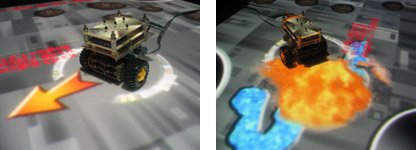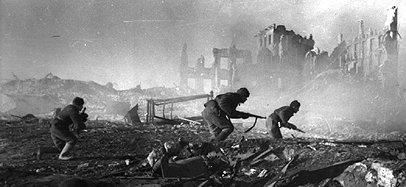The Python Grimoire
Friday, January 20, 2006, 08:37 PM - Robots
grimoire /grimwaar/ (noun) ::= a book of magic spells and invocations. Origin: French, alteration of grammaire 'grammar'. A grammar is a description of a set of symbols and how to combine them to create well-formed sentences. A grimoire is a description of a set of magical symbols and how to combine them properly. It is sort of a recipe-book for magic spells. See also Grimoire
The core of the Grimoire was originally developed and released by Andrew M. Kuchling in May, 1999. However, it never reached a stage where Andrew felt that it was ready for publication, and eventually he withdrew it. Steve Ferg, however, had found the Grimoire very helpful as he was learning Python, and he persuaded Andrew to allow him to take over maintenance of the document in August, 2002.
link
The [AR] Coliseum
Sunday, September 11, 2005, 01:55 PM - Apt-get Install, Games
From the Department of Mechanical Engineering and Intelligent Systems at the University of Electro-Communications in Tokyo:

In this study, a game environment using augmented reality (AR) technology that enables virtual functions for playing a game using small robots is proposed. Similar to how children can use their imaginations to make a normal room into the air for playing games with toy airplane, we propose a way to embody such imaginations virtually by superimposing computer graphics onto toys in the real world.
Playing with toys such as small robots and vehicles is improved and enhanced by projecting images to the areas corresponding to the actual positions and directions of the toys. In addition, objects are able to express the phenomena of this augmented reality world by controlling actuators according to the results of simulations.
In the environment that we propose, the games are played with small robots and vehicles that can be treated as actual toys of the real world.
How cool is that.
link
video
The rest of Tom's Hardware Report on Siggraph
Developing Firefox Extensions with GNU/Linux
Sunday, September 11, 2005, 01:09 PM - Apt-get Install
In '89, an ancient Sumerian deity named Zuul razed downtown New York with her avatar, a flaming, Stay-puft Mallowzilla. In related news, the aptly named "Mozilla Foundation" has released Firefox 1.5 Beta, a web browser built on an easily extended, cross-platform application framework called XUL (pronounced "Zuul"). In this article, I will provide insight into how to professionally develop a Firefox Extension with GNU/Linux. For demonstration, I'll develop an application called Stantz.
This article is directed to anybody who wants to extend Firefox. Experience writing HTML, Javascript, and CSS should be all you need to understand XUL. Some knowledge about the Linux command line and the Python programming language are desirable, but not necessary. You may want to play with an Apache web server's configuration, and experience handling a neutron accelerator pack would certainly help. Thankfully, you won't need to build Mozilla and you won't have to compile any C or C++.
link
cheers luv!
Can war photography survive in a world of instant media?
Saturday, September 10, 2005, 11:27 PM - Copyfight

During his exile from Germany during the Second World War, Bertolt Brecht collected photographs. In Sweden, Finland and finally the USA, he cut out and collated a large number of the images of the war that he found in newspapers and magazines. Before long, he had begun to append to these grim relics a series of four-line poems: ironic epigrams aimed not only at the horror of the war itself, but also at its unprecedented restaging as a photographic spectacle. The resulting book, War Primer (1955), is a graphic record of its author’s insight into the new visual lexicon of global warfare. There are aerial photographs of smoking cities; shots of leaders toying with the latest military hardware (Churchill poses with a tommy-gun; Brecht’s caption declares: ‘gang law is something I can understand’); ludicrous propaganda stunts (Hermann Goering cradles his pet lion cub); and a good many more mutilated corpses than most news editors would nowadays countenance. The book is Brecht’s wartime vindication of his late friend Walter Benjamin’s assertion that truth might be best broached by fragmented, alienated, mechanized form. What would a contemporary War Primer look like?
Shot, by Brian Dillon.
Modern Painters [#sept]
theory and techniques of electronic music
Saturday, September 10, 2005, 07:56 PM - Theory

This book is about using electronic techniques to record, synthesize, process, and analyze musical sounds, a practice which came into its modern form in the years 1948-1952, but whose technological means and artistic uses have undergone several revolutions since then. Nowadays most electronic music is made using computers, and this book will focus exclusively on what used to be called 'computer music', but which should really now be called 'electronic music using a computer'.
Most of the available computer music tools have antecedents in earlier generations of equipment. The computer, however, is relatively cheap and the results of using one are much easier to document and re-create than those of earlier generations of equipment. In these respects at least, the computer makes the ideal electronic music instrument--until someone invents something even cheaper and more flexible than a computer.
[Miller Puckette is also the author of Pure data (pd), a graphical programming language for the creation of interactive computer music and multimedia works, written in the 1990s with input from many others in the computer music and free software communities.]
link
Practice Makes Perfect: manufactured art
Saturday, September 10, 2005, 07:50 PM - Robots
 Southern Exposure presents Practice Makes Perfect: Bay Area Conceptual Craft, an exhibition that investigates the intersection between craft and conceptual art in diverse media by local emerging and established artists. This exhibition will be on view from September 9 to October 15, 2005; and an opening reception will be held on Friday, September 9th from 7 to 9pm. The exhibition and reception are free and open to the public.
Southern Exposure presents Practice Makes Perfect: Bay Area Conceptual Craft, an exhibition that investigates the intersection between craft and conceptual art in diverse media by local emerging and established artists. This exhibition will be on view from September 9 to October 15, 2005; and an opening reception will be held on Friday, September 9th from 7 to 9pm. The exhibition and reception are free and open to the public.
Organized by members of Southern Exposure’s Curatorial Committee, this exhibition establishes the significance of conceptually oriented craft practices as a local and national movement. Practice Makes Perfect explores the work of a group of emerging and established Bay Area artists who utilize highly refined skills to produce conceptually based work. The exhibiting artists undertake labor-intensive actions that are deliberate, elaborate, and verge on the obsessive. Employing materials ranging from the traditional paper, fabric, and wood to unconventional found and damaged objects, they produce work that is rooted in conceptual art, moving beyond well-honed techniques to convey a complex set of ideas. In essence, their craft exists in the service of content.
Featured artists include Ann Chamberlain, Amy Franceschini/ Michael Swaine, David Ireland, Bernie Lubell, Christian Maychack, Jim Melchert, Scott Oliver, Stephanie Syjuco, Mark Thompson, Tony Tredway, and Anna Von Mertens.
link
STATE OF PLAY - MMORPG public space design competition
Saturday, September 10, 2005, 03:28 PM - Robots, Media
Do you enjoy building things in a virtual world? Ever built a virtual house or terraformed a virtual landscape? How about designing public space for your metaverse? Maybe this public architecture resembles the public spaces of old like town squares, markets, transportation hubs or town halls. Maybe not. This competition invites designers and architects to submit examples of the best public, democratic or civic architecture in a virtual world.
Architects from virtual worlds across the universe are invited to submit their designs for public spaces and structures to the State of Play Virtual Public Space Design Competition by September, 28 2005. The State of Play is the annual conference on Law, Videogames and Virtual Worlds (http://www.nyls.edu/stateofplay) co-sponsored by New York Law School’s Institute for Information Law & Policy, Harvard Law School’s Berkman Center for Internet and Society and Yale Law School’s Information Society Project.
link
Back Next












